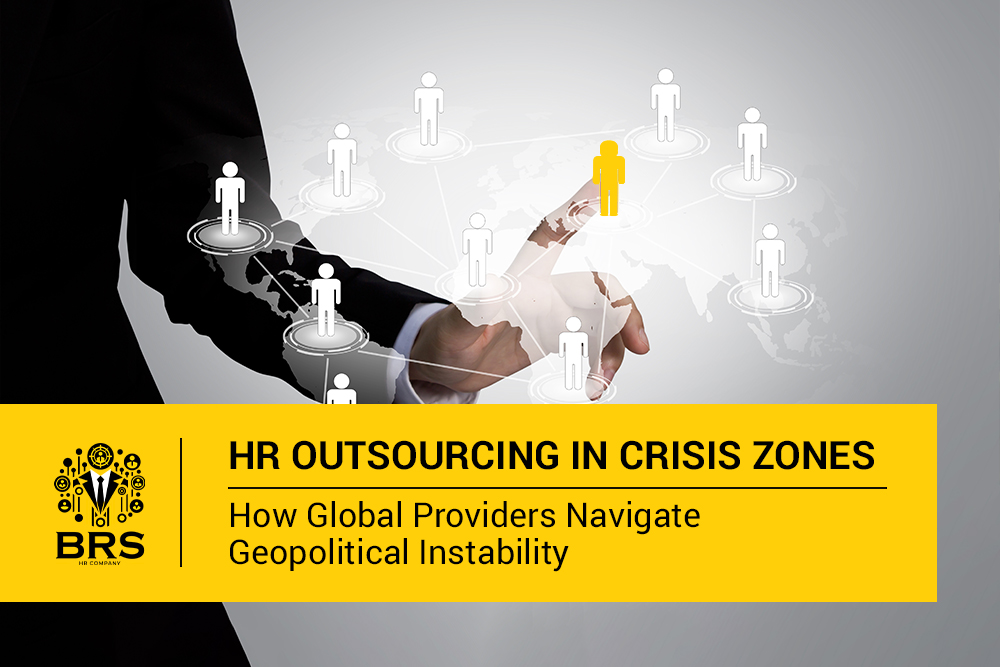As businesses expand globally, many find themselves operating in regions experiencing political instability, natural disasters, civil unrest, or armed conflict. For HR leaders, these crisis zones present extraordinary challenges in maintaining workforce continuity when local infrastructure and institutions are compromised. Increasingly, organizations are turning to specialized HR outsourcing providers with crisis zone expertise to navigate these complex environments. These providers offer unique capabilities in maintaining essential HR functions during disruption while ensuring employee safety and regulatory compliance across volatile jurisdictions.
Understanding the Crisis Zone HR Challenge
Organizations operating in unstable regions face a constellation of HR challenges that transcend typical operational concerns. These challenges include:
- Ensuring physical safety and security for employees amid changing threat landscapes
- Maintaining payroll continuity when banking systems are disrupted
- Navigating rapidly changing compliance requirements in politically volatile environments
- Developing evacuation and relocation protocols for expatriate and local staff
- Managing cross-border movement of employees when borders close unexpectedly
- Addressing trauma and mental health impacts on workforce populations
- Maintaining organizational continuity when physical workplaces become inaccessible
Traditional HR approaches often prove insufficient in these contexts, where established systems and infrastructure may suddenly become unavailable. According to recent global workforce studies, approximately 38% of multinational corporations report significant HR disruptions in crisis-affected regions annually, with these disruptions lasting an average of 3-7 months.
Why Crisis Zone HR Requires Specialized Outsourcing
While many organizations initially attempt to manage crisis zone HR challenges through internal resources, several factors drive the growing trend toward specialized outsourcing in these environments:
Geographic Redundancy Requirements
Organizations operating in volatile regions require geographic redundancy in their HR operations—duplicate systems, processes, and personnel located in different jurisdictions that can assume control when primary locations are compromised. For most companies, maintaining this redundancy internally is prohibitively expensive and complex.
Specialized HR outsourcing providers build their business models around this redundancy, maintaining multiple operating centers across diverse geopolitical regions. This structure allows them to transition operations seamlessly when disruptions occur in any single location, providing continuity that would be impossible for most individual organizations to achieve independently.
Specialized Risk Intelligence Capabilities
Effective HR management in crisis zones requires constant monitoring of evolving security, political, and infrastructure conditions—intelligence capabilities that exceed the scope of traditional HR functions. Leading crisis zone HR outsourcing providers maintain dedicated risk intelligence operations that track:
- Real-time security developments in operating regions
- Infrastructure status including power, telecommunications, and transportation
- Financial system functionality including banking and currency stability
- Border status and immigration policy changes
- Public health conditions and healthcare system capacity
This intelligence informs proactive HR strategy adjustments before conditions deteriorate to critical levels, allowing for orderly workforce adaptations rather than reactive crisis responses.
How HR Outsourcing Providers Maintain Operations in Crisis Zones
Specialized HR outsourcing providers employ several strategic approaches to maintain continuity in challenging environments:
Distributed Processing Architecture
Leading crisis zone HR providers implement distributed processing architectures that eliminate single points of failure in their operations. These systems typically include:
- Multi-region data storage with continuous replication
- Processing capabilities distributed across multiple geographic locations
- Offline operational capabilities when connectivity fails
- Alternative communication protocols when primary channels are compromised
- Backup power generation and satellite connectivity at critical facilities
This distributed architecture ensures that critical HR functions continue uninterrupted even when specific facilities or infrastructure elements become unavailable due to crisis conditions.
Alternative Payment Mechanisms
One of the most challenging aspects of crisis zone HR management is maintaining payroll continuity when conventional banking systems fail. Specialized HR outsourcing providers develop sophisticated alternative payment mechanisms including:
- Digital payment platforms that operate outside traditional banking systems
- Mobile money solutions accessible via basic cellular networks
- Physical cash distribution networks with appropriate security protocols
- Cryptocurrency options in extreme disruption scenarios
- Cross-border payment structures that bypass local financial systems
These alternatives ensure that employees continue receiving compensation even in severely disrupted environments—a critical factor in maintaining workforce stability and organizational loyalty during crisis periods.
Case Studies: HR Outsourcing Success in Crisis Environments
Manufacturing Continuity During Political Upheaval
A global manufacturing company operating in a Southeast Asian country experienced severe disruption when political upheaval led to banking system collapse, telecommunications outages, and widespread civil unrest. Their HR outsourcing partner, which specialized in crisis zone operations, implemented several critical interventions:
- Transitioned payroll processing to their facilities in Singapore while maintaining compliance with local regulations
- Established mobile payment solutions for local employees when bank accounts became inaccessible
- Created temporary satellite internet connections for critical HR functions
- Implemented a distress alert system for employees navigating unsafe areas
- Established evacuation protocols and safe houses for expatriate staff
- Maintained documentation of changing legal requirements under the transitional government
These interventions allowed the company to maintain operations with minimal workforce disruption despite the chaotic external environment, preserving both business continuity and employee welfare during the eighteen-month crisis period.
Energy Sector Response to Natural Disaster
An energy company operating critical infrastructure in a Caribbean nation faced catastrophic HR challenges when a Category 5 hurricane destroyed much of the island’s infrastructure. Their specialized HR outsourcing partner enabled workforce continuity through:
- Immediate activation of their emergency HR command center in Miami
- Deployment of satellite communication equipment to maintain connectivity
- Organization of emergency housing for displaced workers and their families
- Implementation of daily digital check-in protocols to account for all personnel
- Coordination with international aid organizations to ensure employee access to essential supplies
- Establishment of temporary medical clinics for employees and dependents
- Creation of advance payment systems when banking remained unavailable
These measures allowed the company to retain its skilled workforce despite extremely challenging conditions, enabling rapid restoration of critical energy services to the affected region.
The Technology Infrastructure of Crisis Zone HR
Specialized HR outsourcing providers invest heavily in technology infrastructure designed specifically for operational resilience in unstable environments:
Crisis-Resistant Communication Systems
Maintaining communication with workforce populations during crises represents a fundamental challenge for HR operations. Leading outsourcing providers implement layered communication architectures including:
- Satellite-based backup systems independent of local infrastructure
- Mesh network technologies that create connectivity without centralized infrastructure
- Low-bandwidth applications designed to function on degraded networks
- Asynchronous communication protocols that function despite intermittent connectivity
- Radio-based emergency notification systems when digital communications fail
These redundant systems ensure that critical HR communications reach employees regardless of local infrastructure conditions, maintaining organizational coherence during disruption.
Biometric Identity Verification Solutions
In crisis environments where traditional documentation may be lost or inaccessible, specialized HR outsourcing providers implement biometric identity verification systems that allow for:
- Secure authentication of employees without physical identification documents
- Authorization of payments and benefits without conventional banking credentials
- Access control to secure facilities and evacuation transport
- Documentation of attendance and work hours when normal systems are unavailable
- Verification of employee welfare during evolving security situations
These solutions ensure continuity of critical HR functions even when conventional identification and authorization systems become unavailable due to crisis conditions.
Measuring ROI on Crisis Zone HR Outsourcing
Organizations utilizing specialized HR outsourcing in unstable regions measure return on investment through several key metrics:
Business Continuity Economics
Companies operating in crisis-prone regions report an average 4:1 return on investment from specialized HR outsourcing arrangements, measured through business continuity metrics. Organizations typically calculate this return by comparing:
- Revenue preservation during disruption periods versus historical disruption losses
- Employee retention rates during crisis events compared to industry averages
- Recovery time following major disruptions with specialized support versus previous experiences
- Avoidance of compliance penalties and legal complications in rapidly changing regulatory environments
These continuity benefits often far outweigh the premium costs associated with specialized crisis zone HR outsourcing services.
Risk Mitigation Valuation
Beyond direct continuity metrics, organizations report significant value in risk mitigation outcomes, including:
- Reduction in security incidents affecting personnel
- Decreased liability exposure from duty of care obligations
- Lower insurance premiums resulting from enhanced risk management
- Avoidance of reputational damage from workforce disruptions
- Prevention of knowledge and talent loss during extended crises
These risk mitigation benefits, while sometimes challenging to quantify precisely, often represent the most significant long-term value derived from specialized HR outsourcing relationships in volatile regions.
Specialized Services for Different Crisis Typologies
Leading HR outsourcing providers differentiate their offerings based on specific crisis typologies, recognizing that different disruption scenarios require specialized approaches:
Political Instability Specialization
Providers focusing on political instability scenarios develop particular expertise in:
- Navigating rapidly changing compliance requirements under transitional governments
- Managing workforce security amid civil unrest
- Developing neutrality protocols to protect organizations and employees from political targeting
- Creating documentation redundancy when government records become unavailable
- Establishing payment continuity when sanctions or currency controls are implemented
These specialized capabilities are particularly valuable for organizations operating in regions with fragile governance or political transition.
Natural Disaster Response Frameworks
Outsourcing providers specializing in natural disaster scenarios develop distinctive competencies in:
- Predicting workforce impacts from forecast events like hurricanes or floods
- Implementing phased evacuation protocols aligned with disaster timelines
- Creating rapid alternative workplace arrangements for displaced employees
- Establishing emergency benefits systems addressing immediate humanitarian needs
- Developing trauma support programs for affected personnel
These capabilities enable organizations to maintain workforce cohesion and productivity despite severe disruption to physical infrastructure and community systems.
The Future of Crisis Zone HR Outsourcing
As global instability increases across multiple dimensions, several emerging trends are reshaping crisis zone HR outsourcing:
Integration of Predictive Analytics
Advanced HR outsourcing providers are implementing sophisticated predictive analytics capabilities that can:
- Forecast potential crisis developments based on early indicators
- Model likely workforce impacts from emerging scenarios
- Identify vulnerability patterns across specific employee segments
- Predict resource requirements for different disruption typologies
- Generate automated contingency recommendations based on evolving conditions
These predictive capabilities allow for earlier and more effective interventions, shifting crisis response from reactive to proactive models.
Remote Work Integration Strategies
The global adoption of remote work models has created new possibilities for workforce continuity during crises. Leading HR outsourcing providers are developing sophisticated approaches that:
- Rapidly transition on-site workers to secure remote arrangements during emerging crises
- Establish graduated remote work protocols based on threat levels
- Implement secure technology solutions appropriate for compromised environments
- Create hybrid models allowing partial operations in deteriorating conditions
- Develop “work from anywhere” infrastructure enabling geographic flexibility during prolonged disruption
These remote-enabled approaches significantly enhance organizational resilience by decoupling workforce functionality from physical location constraints.
Conclusion: The Strategic Imperative of Crisis-Ready HR
For organizations operating in volatile regions, specialized HR outsourcing partnerships have evolved from optional advantages to strategic imperatives. As political instability, climate disruption, and social unrest increase globally, the ability to maintain workforce continuity amid crisis conditions increasingly determines organizational survival and competitive advantage.
By partnering with HR outsourcing providers that specialize in crisis environments, organizations gain access to expertise, infrastructure, and operational capabilities that would be impossible to develop internally. These partnerships create resilience that transcends traditional business continuity approaches, enabling organizations to maintain operations and protect personnel even in severely compromised environments.
As the global operating environment becomes increasingly unpredictable, this crisis resilience represents one of the most significant yet underappreciated benefits of strategic HR outsourcing relationships. Organizations that develop these partnerships proactively, before crises emerge, position themselves for sustained success in a world where disruption is becoming the norm rather than the exception.





